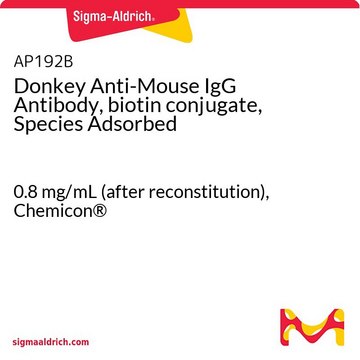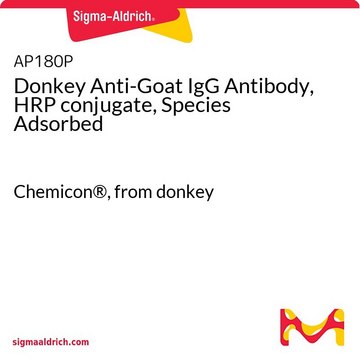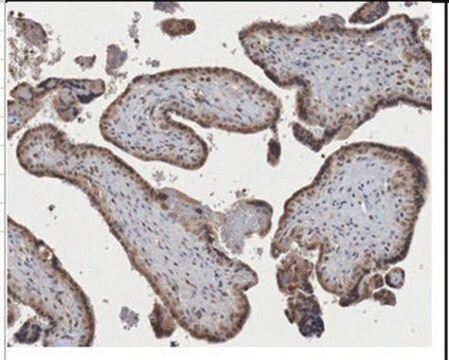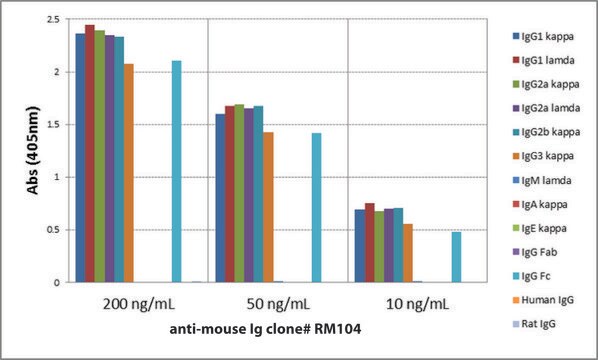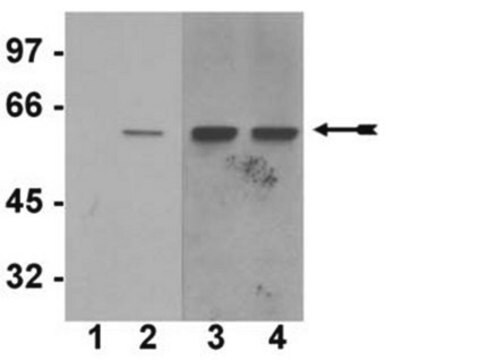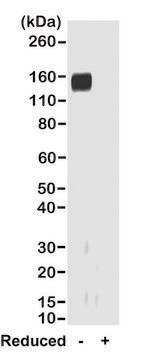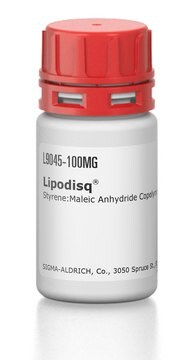AP181B
Goat Anti-Mouse IgG Antibody, biotin-SP conjugate, Species Adsorbed
Chemicon®, from goat
Sign Into View Organizational & Contract Pricing
All Photos(1)
About This Item
UNSPSC Code:
12352203
eCl@ss:
32160702
NACRES:
NA.46
Recommended Products
biological source
goat
Quality Level
conjugate
biotin conjugate
antibody form
F(ab′)2 fragment of affinity isolated antibody
antibody product type
secondary antibodies
clone
polyclonal
species reactivity
mouse
manufacturer/tradename
Chemicon®
technique(s)
ELISA: suitable
western blot: suitable
shipped in
wet ice
target post-translational modification
unmodified
Related Categories
Specificity
Mouse IgG (H+L) (absorbed for minimal cross-reactivity to Rat, Human, Bovine and Horse Serum Proteins)
Application
Detect Mouse IgG using this Goat anti-Mouse IgG Antibody, biotin-SP conjugate, Species Adsorbed validated for use in ELISA & WB.
Research Category
Secondary & Control Antibodies
Secondary & Control Antibodies
Research Sub Category
Secondary Antibodies Adsorbed for Dual Labeling
Secondary Antibodies Adsorbed for Dual Labeling
Suggested dilution for most applications:
1:50,000-1:1000,000 for ELISA
1:10,000-1:1000,000 for Western blots
1:500-1:5000 for immunohistochemistry
1:200-1:1000 for FACS
1:50,000-1:1000,000 for ELISA
1:10,000-1:1000,000 for Western blots
1:500-1:5000 for immunohistochemistry
1:200-1:1000 for FACS
Physical form
Lyophilized. Buffer = 0.01 M Sodium Phosphate, 0.25 M NaCl, pH 7.6, with 0.05% Sodium Azide.
RECONSTITUTION:
Reconstitute with sterile distilled water.
RECONSTITUTION:
Reconstitute with sterile distilled water.
Storage and Stability
Maintain lyophilized product at 2-8°C for up to 12 months. After reconstitution the product is stable for several weeks at 2-8°C as an undiluted liquid. For extended storage after reconstitution, add an equal volume of glycerol to make a final concentration of 50% glycerol followed by storage at -20°C in undiluted aliquots for up to 12 months. Please note the concentration of protein (and buffer salts) will decrease to one-half of the original after the addition of glycerol. Avoid repeated freeze/thaw cycles.
Legal Information
CHEMICON is a registered trademark of Merck KGaA, Darmstadt, Germany
Disclaimer
Unless otherwise stated in our catalog or other company documentation accompanying the product(s), our products are intended for research use only and are not to be used for any other purpose, which includes but is not limited to, unauthorized commercial uses, in vitro diagnostic uses, ex vivo or in vivo therapeutic uses or any type of consumption or application to humans or animals.
Not finding the right product?
Try our Product Selector Tool.
Hazard Statements
Precautionary Statements
Hazard Classifications
Aquatic Chronic 3
Storage Class Code
11 - Combustible Solids
WGK
WGK 3
Certificates of Analysis (COA)
Search for Certificates of Analysis (COA) by entering the products Lot/Batch Number. Lot and Batch Numbers can be found on a product’s label following the words ‘Lot’ or ‘Batch’.
Already Own This Product?
Find documentation for the products that you have recently purchased in the Document Library.
An imbalance between apoptosis and proliferation contributes to follicular persistence in polycystic ovaries in rats.
Salvetti, NR; Panzani, CG; Gimeno, EJ; Neme, LG; Alfaro, NS; Ortega, HH
Reproductive Biology and Endocrinology null
Effect of a biological response modifier on expression of growth factors and cellular proliferation at drying off.
B E Dallard, V Ruffino, S Heffel, L F Calvinho
Journal of Dairy Science null
Intraovarian localization of growth factors in induced cystic ovaries in rats.
H H Ortega, N R Salvetti, P Amable, B E Dallard, C Baravalle, C G Barbeito, E J Gimeno
Anatomia, Histologia, Embryologia null
Suppression of arthritis by forced expression of cyclin-dependent kinase inhibitor p21(Cip1) gene into the joints.
Y Nonomura, H Kohsaka, K Nasu, Y Terada, M Ikeda, N Miyasaka
International Immunology null
Selective inhibition of p38alpha MAPK improves cardiac function and reduces myocardial apoptosis in rat model of myocardial injury.
Li, Z; Ma, JY; Kerr, I; Chakravarty, S; Dugar, S; Schreiner, G; Protter, AA
American Journal of Physiology. Heart and Circulatory Physiology null
Our team of scientists has experience in all areas of research including Life Science, Material Science, Chemical Synthesis, Chromatography, Analytical and many others.
Contact Technical Service

